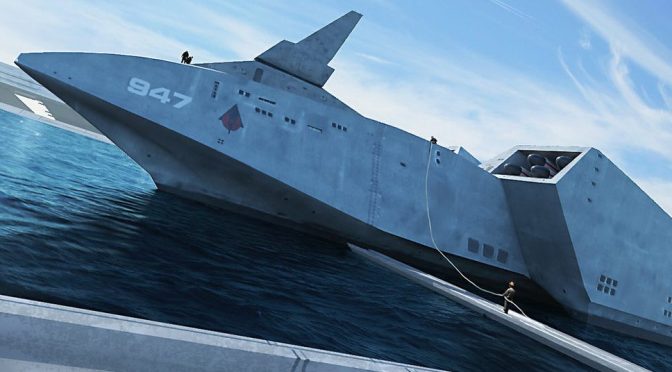3rd Place Finisher
By Robert Williscroft
I eased myself through the hatch into the water. My satpack increased suit pressure slightly to compensate for the press of seawater a thousand feet below the surface and turned up the heat to counter the 27° temperature. I dropped down ten feet to make room for my team. I observed each entry in my heads-up—Jer, Ski, Harry, Bill, and Sergyi, each with his own avatar. Just above them in my heads-up, our sub appeared as a gray blob, too large for any distinguishing characteristics. We carried URA-24s holstered to our legs, automatic underwater rifles with sixty hypervelocity rounds in the magazine and one in the chamber.
The seafloor was a hundred feet below, and the water was crystal clear. A thousand feet above, the sun shined brightly over the South China Sea, but not a single ray penetrated to where we were, on the seafloor, some forty nautical miles southwest of the Hainan Island coast. We were in international waters but very much inside the Chicoms’ exclusive economic zone. Somewhere below, yet nearby, was a Chicom acoustic array that allowed their intelligence people to identify and track every American submarine in the South China Sea outside the continental break. Our job was to take it out.
“Status,” I said, my helium and pressure distorted voice sounding normal in my team’s ears following appropriate processing. The five avatars in my heads-up bobbed in sequence. Even though we used Code Division Multiple Access (CDMA) packets for communicating, we tried to keep comms to a minimum. We knew how to locate CDMA transmissions. Intel said the Chicoms didn’t, but we weren’t taking any chances. I angled down and headed for the bottom.
My team followed, spread out, thirty feet between divers, two to my right and three to my left. My heads-up indicated our course was 308°—exactly normal to the acoustic array we sought. The sub’s initial side-scan informed us the array lay nearby ahead of us. I carried a low-power, high-frequency CDMA scanner that detailed the bottom fifteen feet below us with quarter-inch resolution. Its return appeared in each team member’s heads-up. Twenty minutes into our survey, Sergyi’s avatar on the far right flashed.
We dropped to the bottom, having no idea what kind of sensors the array had. We turned to the right, following Sergyi’s lead in a column until the array lay directly below us, five feet down. That’s when the entire acoustic array flashed brilliant white, and I shut my eyes, pain coursing through my body. Then a disorienting wrenching twist, and I opened my eyes to find myself in an encasing chair in a featureless room.
A deep voice that seemed to come from everywhere said, “Well, that didn’t go so well. Talk it over. Figure out what you did wrong, and then we’ll do it again.”
___________________________________________________________________________
I eased myself through the hatch into the water. My satpack increased suit pressure slightly to compensate for the press of seawater eleven hundred feet below the surface and turned up the heat to counter the 27° temperature. I dropped down ten feet to make room for my team. I watched each entry in my heads-up—Jim, Doc, Hank, Jack, and Sergyi, each with his own avatar. Just above them in my heads-up, our sub appeared as a gray blob, too large for any distinguishing characteristics. Our automatic underwater rifles with sixty hypervelocity rounds in the magazine and one in the chamber were holstered to our legs.
The seafloor was eighty feet below us, and the water was crystal clear. Eleven hundred feet overhead, the sun shined brightly over the South China Sea, but nothing reached us on the seafloor, some thirty-five nautical miles from the southwest coast of Hainan Island. We were in international waters but very much inside the Chicoms’ exclusive economic zone. Somewhere below us, perhaps five miles farther away from Hainan, was a Chicom acoustic array that allowed their intelligence people to identify and track every American submarine in the South China Sea outside the continental break. Our job was to find and cut the cable feed for the array.
“Status,” I said, my helium and pressure distorted voice sounding normal in my team’s ears following appropriate processing. The five avatars in my heads-up bobbed in sequence. Even though we used CDMA packets for communicating, we tried to keep comms to a minimum. We knew how to locate CDMA transmissions. Intel said the Chicoms didn’t, but we weren’t taking any chances. I angled down and headed for the bottom.
My team followed, spread out, thirty feet between divers, three to my right and two to my left. My heads-up indicated our course was 008°—exactly normal to the acoustic array cable feed we sought. The sub’s side-scan informed us the array lay about five nautical southwest of us. I carried a low-power, high-frequency CDMA scanner that detailed the bottom immediately below us with quarter-inch resolution. Its return appeared in each team member’s heads-up. Twenty minutes into our survey, I spotted the return from the cable feed.
We dropped to the bottom to cut the cable feed. Unless we were under visual or sensor observation, the Chicoms could not possibly know we were there. I grabbed the cable in my cutter, but before I could cut the cable, something grabbed my arm and jerked me away. The area flooded with light. I saw my team members crumpled on the bottom, not moving. Excruciating pain from my right arm forced me to turn my head, only to see my severed arm hit the sand just before I passed out. A disorienting wrenching twist, and I opened my eyes to find myself once again back in the encasing chair in the featureless room, my right arm aching like hell.
The deep voice said, “That didn’t go well at all. Perhaps we need to take a different approach.”
___________________________________________________________________________
I eased myself through the hatch into the water. My satpack increased suit pressure slightly to compensate for the press of seawater thirteen hundred feet below the surface and turned up the heat to counter the 27° temperature. As my feet touched the bottom and I moved aside to make room for my team, an image flashed into my mind. Somehow, somewhere, I knew I had done this before. I watched each entry in my heads-up—Tubes, Pipes, Rog, Spike, and Boris, each with his own avatar. Just above them in my heads-up, our sub appeared as a gray blob, too large for any distinguishing characteristics. Our URA-24s holstered to our legs carried sixty hypervelocity rounds in the magazine and one in the chamber.
The water was crystal clear. Thirteen hundred feet above us, the sun shined brightly over the South China Sea, but it was pitch black on the seafloor, some thirty-five nautical miles from the southwest coast of Hainan Island. We were in international waters but very much inside the Chicoms’ exclusive economic zone. And this all was completely familiar—a been there, done that feeling overwhelmed me. We were looking for an acoustic array, and something was going to happen—I didn’t know what, but something definitely was going to happen.
Change the pattern, I commanded myself, change the pattern. On impulse, I headed for the surface, thirteen hundred feet above me.
“Stop!” Boris shouted on the comm system. “What are you doing?”
“Changing the pattern,” I answered, continuing upward.
When I reached my upward excursion limit of 170 feet, the water around me flashed with bright light. I felt a disorienting wrenching twist, and I opened my eyes to find myself once again back in the encasing chair in the featureless room. My arm didn’t ache.
“Why did you do that?” the deep voice asked.
“Change the pattern,” I said. “Don’t want to die.”
___________________________________________________________________________
I was on the periscope stand of a nuclear submarine. “Right full rudder, ten degrees down bubble!” I ordered. The Chinese words that came out of my mouth were, “Yòu quán duò! Xiàng xià shí dù!”
“Change the pattern!” I said. My words were, “Gǎibiàn móshì.”
A flash, a disorienting wrench…I was in a brightly lit high-tech room. Another flash, another wrench…I was once again back in the encasing chair in the featureless room.
“Stop it!” the deep voice ordered.
“Stop what?” I asked. “Change the pattern…”
___________________________________________________________________________
I was a fighter pilot landing a Navy jet on a carrier. Instinctively, I knew my glide path was too steep.
“Change the pattern,” I said.
“Abort…abort…abort!” the Landing Signal Officer ordered. I heard, “Zhōngzhǐ, zhōngzhǐ, zhōngzhǐ.”
The flash, the wrench…and I was in another brightly lit high-tech room…for a moment. Then I was once again in the encasing chair in the featureless room.
I couldn’t understand the deep voice. Sounded like he was speaking Chinese. I started to get pissed off. I sat up.
“What the fuck!” I yelled.
Another flash, and I was back in the high-tech room. It was filled with people—in uniform, Navy uniforms…not American…
FLASH…
I ride a Gryphon hardshell wingsuit. In my heads-up, my squad shears away to avoid incoming missiles. Cowboy winks out; Jerico starts moving erratically. I am still doing 300 knots when I get hit…
FLASH…
Firefight…exoarmor taking hits from all sides. I leap over a forty-foot canyon, but a 50 cal catches my chest in mid-jump…
FLASH…high-tech room…featureless room…
FLASH…fighter’s out of control…eject…eject…chute fails to open…
FLASH
Featureless room…
“You got a handle on it yet, Ski” someone yells.
“That’s a negative. They’re overpowering my firewall…can’t hold ’em.”
“Get the fucking helmet off him!” Sounds like a female.
Something touches my head.
FLASH…
I try to roll over, but the encasing chair holds me in place. Something touches my head.
FLASH…
High-tech room…
FLASH
Featureless room, encasing chair…
“Get that fucking helmet off him!” Still sounds like a woman.
FLASH…
Everything goes dark and quiet.
___________________________________________________________________________
I opened my eyes slowly. A female with a concerned look on her face attempted to look into my eyes with an eye-exam light. A stethoscope was draped around her neck. I could see her boobs down her blouse. I blinked and shook my head.
“Hold still,” she said.
I did.
“What happened?” I asked.
A male face took her place, older, accompanied by oak leaves on his collar. “What’s your name?” he asked.
I had no idea.
“Do you know where you are?” he asked.
I didn’t.
He said, “You are Lt. Alex Randal. You were in deep VR, training for a classified saturation dive mission South China Sea seafloor off Hainan Island. The Chicoms hacked our VR system. They looped your mission, tossing in different variables. They penetrated our VR training library, started throwing all kinds of scenarios at you. Somehow, you jumped into their control VR, and then our anti-hacker squad got into a pissing match with their hackers. You were caught in the middle…
FLASH…but I wasn’t wearing a helmet…FLASH…the high-tech room…FLASH…Chinese voices all around me…and I understood everything that was being said…FLASH…“Welcome back” (in Chinese)…someone handed me a cup of tea, a pretty Chinese technician in a white lab coat…no boobs. She gestured to a chair at a table and smiled warmly.
“Let’s see what you discovered this time.”
Robert Williscroft is a retired submarine officer, deep-sea and saturation diver, scientist, author, and lifelong adventurer. He spent 22 months underwater, a year in the equatorial Pacific, three years in the Arctic ice pack, and a year at the Geographic South Pole. He holds degrees in Marine Physics and Meteorology, and a doctorate for developing a system to protect SCUBA divers in contaminated water. He is a prolific author of non-fiction, Cold War thrillers, and hard science fiction. He lives in Centennial, Colorado, with the girl of his dreams and her two cats.
Featured Image: “Sea Cave” by Bence Száraz via Artstation.


